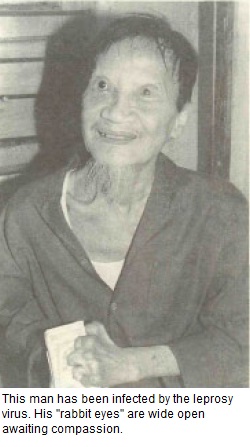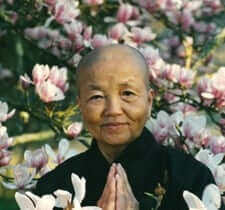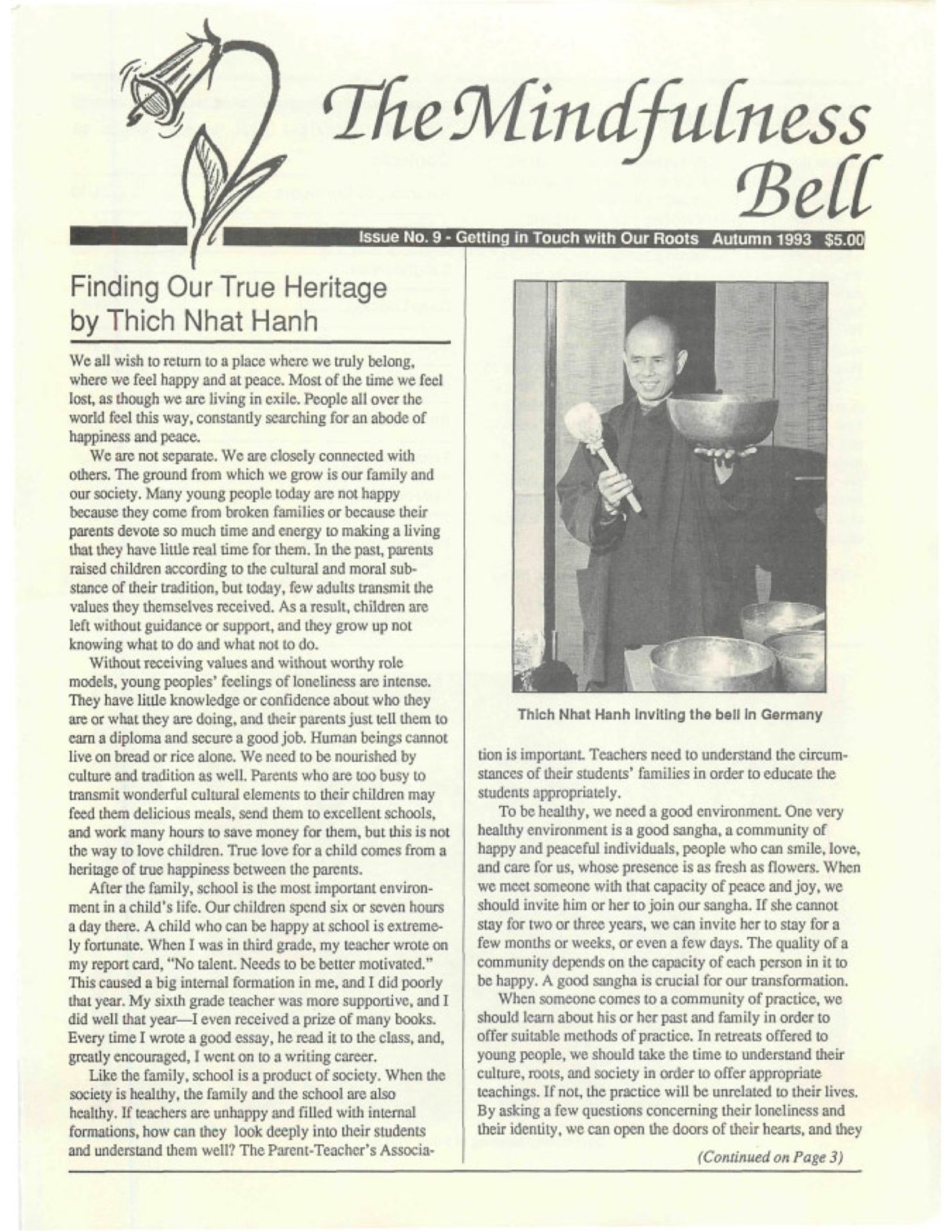By Sister Chan Khong in September 1993
During the past ten years, I have shared with my friends the art of transforming internal suffering from our childhood and of our past into wholesome seeds. Thanks to this work, I can be friends with those who do not suffer from a lack of food and shelter, but who do suffer from a lack of love and understanding. I invite these people to join my friends in Vietnam on this trip of touching the other side of suffering.
By Sister Chan Khong in September 1993
During the past ten years, I have shared with my friends the art of transforming internal suffering from our childhood and of our past into wholesome seeds. Thanks to this work, I can be friends with those who do not suffer from a lack of food and shelter, but who do suffer from a lack of love and understanding. I invite these people to join my friends in Vietnam on this trip of touching the other side of suffering.
Letter from Sister MM,
During this winter, the number of sick people needing treatment increased greatly. Patients from poor families only go to the hospital when they are dying. We have good physicians and nurses, but our problem is we can prescribe medicine but we cannot purchase it for our patients. The patients must manage to find their needed medicines and buy them with their money. Many times I have seen people die because they didn't have $8 to buy 100 cc of blood needed for surgery. I don't know where to find money to offer them. It breaks my heart when I see a father of five young children dying from a very mild disease like diarrhea, just because his wife does not have money to buy the needed medication for him.
***
With your donations we have visited 815 patients in five psychiatric hospitals. The old and sick lie paralyzed in their beds. Many patients, from destitute families, are totally isolated. Their families do not have time to visit them, nor do they have money to spare to buy medicine and food. These patients are so happy when they see us. When we visit, we suggest that they be in touch with their calming breath and let go of their past; that they feel the warmth of the hospital while rain, storms, and floods are outside, devastating those with no shelter. The chief physician reported that our visits to these patients have helped to restore their calmness and joy. Some of their illnesses have disappeared like a miracle. They request that we visit often, and we want to. However, every time we visit, we bring a small container of milk or a package of noodles to each patient, as a way of showing our concern. But even giving such a small gift to 815 patients, adds up to nearly $1,000 per visit.
***
In Vietnam, there are forty million children between the ages of one and seventeen. Children are very fragile both morally and emotionally. We have devoted a lot of energy to support these young sprouts so they can grow with love and care.
Recently we hired a bus to bring rice, used clothes, and medicine to families in remote areas. The staff consists of one monk, two nuns, and one physician. We distribute rice to the hungry, and clothes to children who are nearly naked.
We wish you could see these children, their lips blue from the cold. After receiving some rice balls, a shirt, a pair of trousers, and learning a few songs, these children are radiant like angels. Because of the continuous threat of hunger, many families leave the countryside for big cities. In the cities, these children easily become delinquent. Our goal is to raise enough money for these children to stay in their home villages and give them the opportunity to attend school.
The most encouraging work has been to help peasant children living in remote areas with their education. These areas have no nursery schools or elementary schools. Many peasants are illiterate. In order to make ends meet, they work long and hard to find enough food for their families. The parents feel desperate when they see their children growing up quickly; not knowing how to read or write. There are a few public schools but because living conditions are so poor, many teachers graduating from city colleges decline working in these areas. As the monthly salary for a teacher is very low, they prefer to stay in the city and find other work. We began a program that pays each teacher $20 monthly. This allows forty children to attend school. In order to improve the quality of their teaching, the sangha of local social workers in Thua Thien offers a monthly Day of Mindfulness for all teachers in these remote areas. At the end of the day, they exchange experiences as teachers. We supported 120 teachers in March, and 180 teachers in June.
We have increased the number of scholarships for children in impoverished areas like Thua Thien, Quang Tri, Quang Binh, Nghe An, and Ha Tinh. The sum of $23,000 was tranferred to Vietnam in January 1993 as the installment for the first quarter. We are committed to send that same amount every three months: $8,500 to Thua Thien, $7,500 to Saigon, $4,500 to Phu Khanh and Quang Ngai, and $2,500 for children in North Vietnam who are healed from leprosy but who need help in starting a new life. Each child needs $10 monthly, or $120 annually.
Scholarships are needed for teenagers to develop vocational skills. Many teenagers have to abandon school to support their families. Without professional skills it is not easy for them to work. We spend $36,000 to provide 300 teenagers with a year of vocational training.
Vietnam needs good leadership to honestly serve the nation. We are only able to give 280 scholarships to talented university students, including monks and nuns. With your help, we'd like to increase the support of these students. Relief work is needed for lepers and children of single parents who have asthma, tuberculosis, hepatitis, or cancer. We offer $80 three times a year to support these destitute families. In 1992 we helped support 320 families.
A woman recently visiting a leper camp writes:
Dear Sister, We have visited the leper camps in the mountain area of North Vietnam. The road was so rough and dangerous, that on the way I was wondering if I was going to visit a leper camp or an isolated reeducation camp for political prisoners. Because the leper camps are so difficult to reach, the lepers have to grow their own food, which consists mainly of manioc roots. The rocky mountain soil is very hard for them to work, especially when their hands have many open wounds on them. Many slowly lose their fingers. It broke our hearts to see them shivering under their thin cloth, with the icy autumn winds. Many have lost both legs, while they have never even seen a wheel chair. The physician has already built two groups of houses for the lepers. Each group house costs $4,320. There are sixteen beds in each house, in which thirty people stay. A leg prosthesis for a leper costs $30. We have helped build two group houses, supplied 10 lepers with leg prostheses, and have given forty scholarships to leper children.
The winter rains caused rivers to overflow, flooding villages and destroying lives, houses, and cattle. We offered $3,000 to victims of Quang Tri and Quang Binh, $3,000 for victims in Ha Tinh and Nghe An, and $4,000 to buy blankets for all of them in January 1993.

-------------------------------------------------------------------


